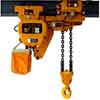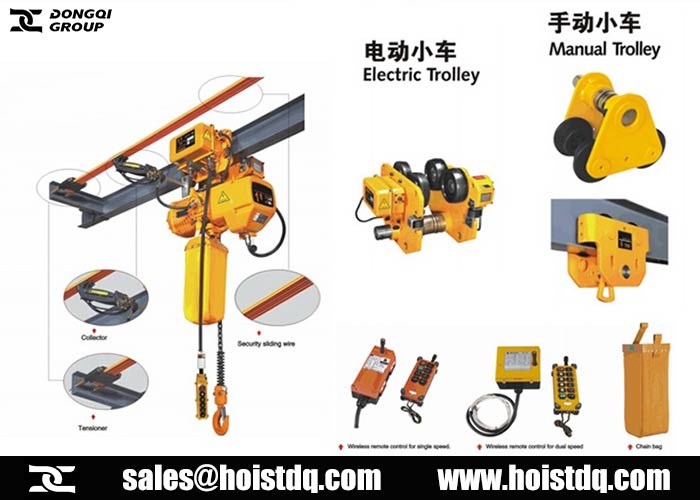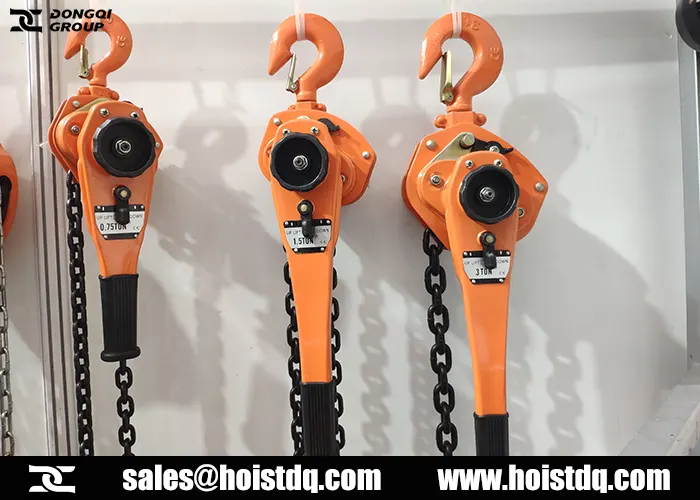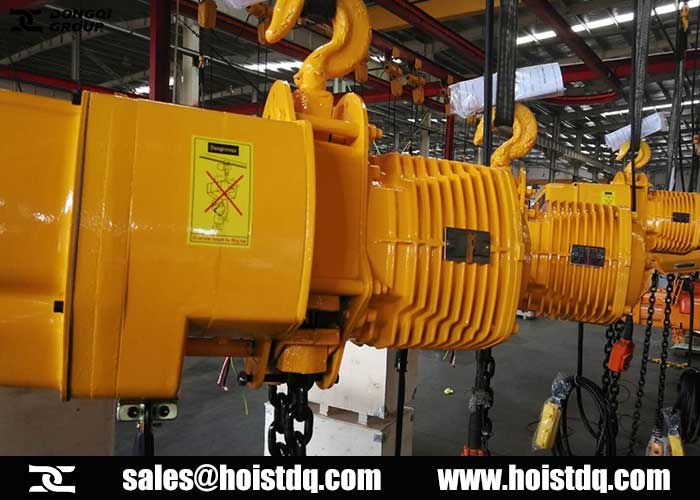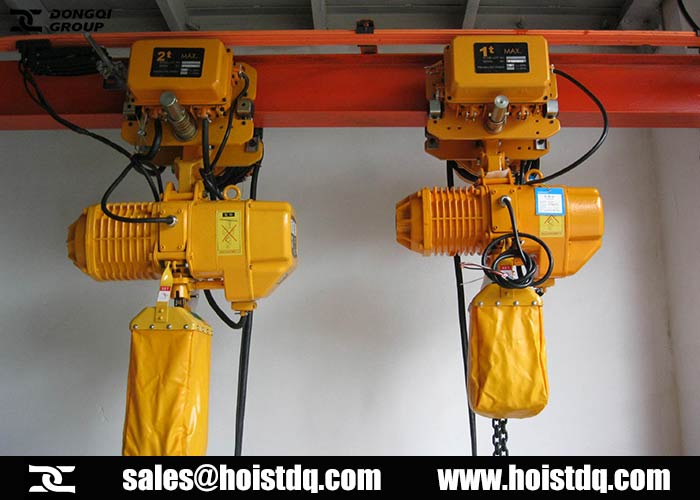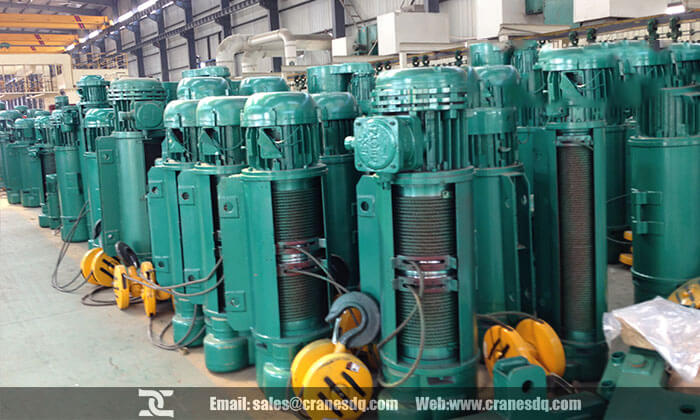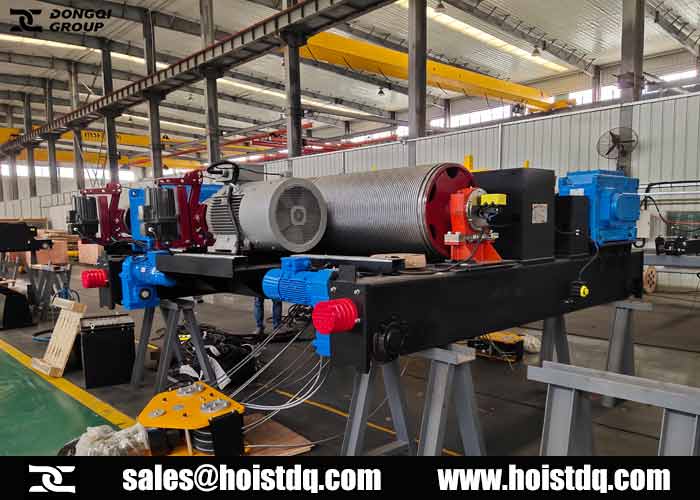Electric Hoists, Manual Hoist, Chain Hoist, Wire Rope Host, Liver Hoist
Overhead hoists are defined in the ANSI/ASME standards as a machinery unit that is used for vertical lifting service involving material handling of freely suspended (unguided) loads. Overhead hoists are a basic and versatile piece of equipment used in manufacturing, warehousing, construction and numerous other applications to aid workers in the handling and moving of loads.
Overhead hoists are available in various types of configurations and constructions. overhead hoist types are usually referred to using terms that define a specific configuration and construction. Three areas that further define the hoist type are:
Lifting Medium: Lifting medium defines the type of component used to transmit and cause vertical motion of the hoist load hook or hoist load block. Lifting mediums include wire rope or chain..
Operation: Operation defines the type of power used to operate the hoisting motion. Operation types include manual power, electric power or pneumatic (air) power.
Suspension: Suspension defines the type of mounting or method used to mount or suspend the hoist. Common suspension types include hook mounted, lug mounted and trolley mounted. Other types of suspension may be designed to meet specific application requirements.
When the above various types of configurations or constructions are considered, some of the names used to refer to overhead hoists include: hook mounted manually operated hand chain hoists; electric chain hoists; pneumatic (air) chain hoists; electric wire rope hoists; pneumatic (air) wire rope hoists; trolley mounted wire rope hoists; etc. Manually lever operated hoists are considered an overhead hoist and are not covered in this section.
Lifting Medium Types
Welded Link Load Chain
Welded link load chain consists of a series of interwoven formed and welded links. The links fit pockets of the hoist load sprocket that transmits motion to the load chain. The load sprocket may also be called load wheel, load sheave, pocket wheel or lift wheel. Welded link load chain sizes are stated as the diameter of the wire used to form the link, i.e. 1/4″, 5/16″, etc. Welded link load chain is designed and manufactured to specific dimension and material strength requirements for a specific hoist. Welded link load chain is not interchangeable between different manufacturers’ hoists; and is not interchangeable with welded link lifting chain used for other purposes, such as chain slings and load securement. Only welded link load chain with specifications as originally stated by the hoist manufacturer should be used on any welded link load chain hoist.
Roller Load Chain
Roller load chain consists of a series of alternately assembled roller links and pin links where the pins articulate inside bushings and the rollers are free to turn on the bushings. Pins and bushings are press fit in their respective link plates. The links fit teeth of the hoist load sprocket that transmits motion to the load chain. The load sprocket may also be called load wheel, load sheave, pocket wheel, chain wheel or lift wheel. Roller load chain sizes are stated as the pitch or spacing between pins, i.e. 5/8″, 3/4″, etc. Roller load chain for use on hoists is designed and manufactured to specific material strength requirements for hoist applications. Roller load chain for hoist applications has different manufacturing specifications than roller chain for power transmission applications. Therefore, hoist roller load chain is not interchangeable with power transmission roller chain. Only roller load chain with specifications as originally stated by the hoist manufacturer should be used on any roller load chain hoist.
Wire Rope
Wire rope consists of a core, strands and wire that comprise a strand. The wire rope fits and wraps onto grooves on the circumference of the hoist drum that transmits motion to the wire rope. Wire rope sizes are stated as the diameter of a circle that would enclose the wire rope strands, i.e. 5/16″, 3/8″, etc. Each wire rope size is available in various rope constructions and materials. The construction and material strength requirements of the wire rope are selected by the hoist manufacturer in accordance with the design specification requirements of the hoist. Therefore, only wire rope with specifications as originally stated by the hoist manufacturer should be used on any wire rope hoist.
Operation Types
Hand Chain Manual Power
The hoisting motion of hand chain manually operated hoists is achieved by the operator grasping and pulling a continuous hand chain sustended from the hoist. Hand chain consists of a series of interwoven formed welded or unwelded links according to the design specifications of the hand chain. The hand chain links fit pockets of the hoist hand chain wheel or sprocket. As the operator pulls the hand chain, the hand chain wheel turns and transmits power through the hoist gearing to the hoist load chain sprocket. Pulling the hand chain in one direction will cause the hoist load hook to travel in one direction (Lift or Lower); and pulling the hand chain in the opposite direction will cause the hoist load to travel in the opposite direction (Lift or Lower).
Hand chain manually operated hoists are available with only welded link load chain or roller load chain as the lifting medium. Higher capacity hand chain manually operated chain hoists may have multiple hand chains suspended from the hoist. Hoists that have multiple hand chains require multiple operators, each grasping and pulling one of the hand chains.
Electric Power
The hoisting motion (lifting or lowering) of electric powered hoists is achieved by the operator grasping and activating a control device. The control device has push buttons or levers that energize, through a series of contactors and other electrical components, an electric motor. The electric motor transmits power through the hoist gearing to the hoist load chain sprocket or hoist drum; thereby, lifting or lowering the hoist load hook. Lifting is accomplished by actuating the lifting control and lowering is accomplished by actualling the lowering control. The controls could be marked: L:IFT/LOWER; UP/DOWN; RAISE/LOWER; arrows designating up/down; or a combination of such markings. Hoist lifting and lowering controls are usually push buttons mounted in a pendant control enclosure suspended from the hoist; or levers or switches mounted in a remote radio-control transmitter. Pendant control enclosures, radio-control transmitters or other control means could also be permanently mounted on the building structure or cab of an overhead crane depending on the application.
The control device used to lift and lower hoist motion may also contain controls for other motions or functions. Such controls include: trolley travel, overhead crane travel, power on/off, emergency stop, motions associated with below-the-hook lifting devices and other special functions associated with a specific application. Examples of such control markings may include, but are not limited to: EAST/WEST; RIGHT/LEFT; OPEN/CLOSE; START/STOP; etc.
Pneumatic (Air) Power
The hoisting motion (lifting or lowering) of pneumatic (air) powered hoists is achieved by the operator grasping and activating a control device. The control device has push buttons or levers that energize, through a series of valves and other air components, an air motor. The air motor transmits power through the hoist gearing to the hoist load chain sprocket or hoist drum; thereby, lifting or lowering the hoist load hook. Lifting is accomplished by actuating the lifting control and lowering is accomplished by actualling the lowering control. The controls could be marked: L:IFT/LOWER; UP/DOWN; RAISE/LOWER; arrows designating up/down; or a combination of such markings. Hoist lifting and lowering controls are usually push buttons or levers mounted in a pendant control enclosure suspended from the hoist; or pull controls or rold controls suspended from the hoist. Pendant control enclosures could also be permanently mounted on the building structure or cab of an overhead crane depending on the application.
Pull control consists of two pull chains or two pull cords having handles marked for hoisting direction and suspended from the hoist. Rod control consists of a rod handle suspended from the hoist and controls motion by linear or rotary movement of the rod handle or a combination of linear and rotary motion.
A control device of the type used to lift and lower hoisting motion of an air powered hoist may also be used for other motions or functions, such as trolley travel, overhead crane travel, etc. Examples of such control markings may include, but are not limited to: EAST/WEST; RIGHT/LEFT; OPEN/CLOSE; START/STOP; etc.
hand chain hoist electric or air chain hoist wire rope hoist
Hand Chain Hoist Electric or Air Powered Chain Hoist Electric or Air Powered Wire Rope Hoist
Suspension Types
Hook Mounted
Hook mounted hoists have a top hook on the hoist frame or body that can be used to suspend the hoist from the clevis or suspension pin of a trolley; or a fixed suspension device that will accept the hook, mounted on a beam or the structural framework of a building. Hook mounted hoists normally have only welded link load chain or roller load chain as the lifting medium, because the load chain lifting medium is always in line with the top hook. Hook mounted hoists include: hand chain manually operated chain hoists, electric chain hoists and air chain hoists. Wire rope hoists are not normally hook mounted because the loading position on the drum moves as the wire rope is wound or unwould on the drum, and therefore not in line with a top hook. Hook mounted wire rope hoists can be furnished; however, they may require multiple top hooks and special design considerations by the hoist manufacturer.
Lug Mounted
Lug mounted hoists have a lug mounting attached to the top of the hoist frame, or a lug mounting attached as an integral part of the hoist frame. Lug mounted hoists are available in all hoist types. Lug mountings are used to suspend the hoist from a trolley, or a fixed suspension device mounted on a beam, or the structural framework of a building. Lug mounted hoists are suspended from a trolley, beam or structural framework by the use of suspension pin(s) or stud(s).
Trolley Mounted
Trolley mounted hoists are hook mounted, clevis mounted or lug mounted hoists suspended from a trolley or trolleys; or a hoist having an integral trolley as part of the hoist frame, that allows travel motion on the lower flange of a monorail beam, or the lower flange of the bridge beam of an overhead crane.
Trolleys
Trolleys allow traverse motion of the hoist unit and load being handled, by traveling: on the lower flange of a monorail beam; on the lower flange of a bridge beam of an overhead crane; or on top of the bridge beams of an overhead crane. Hoist trolleys are available in several types, depending on the method used to obtain travel motion.
Plain Trolleys
The travel motion of plain type trolleys is obtained by pulling or pushing the load or by some other means, such as the strain relief of a pendant control, suspended from the trolley or hoist. Plain type trolleys are recommended where trolley motion is infrequent or relatively short. Because of the force required to manually operate this type of trolley, it is recommended that the use of plain trolleys be limited to a maximum capacity load of 3 tons or 3000 kg, and that the elevation of the beam where the trolley is suspended be not more than 20 feet or 6 meters above the operating floor level.
Hand Chain Operated Trolleys
The travel motion of hand chain manually operated trolleys is achieved by the operator grasping and pulling a continuous hand chain suspended from the trolley. Hand chain consists of a series of interwoven formed welded or unwelded links according to the design specifications of the hand chain. The hand chain links fit pockets of the trolley hand chain wheel or sprocket. As the operator pulls the hand chain, the hand chain wheel turns and transmits power through gearing to the trolley wheels. Pulling the hand chain in one direction will cause the trolley to travel in one direction; and pulling the hand chain in the opposite direction will cause the trolley to travel in the opposite direction. Hand chain manually operated trolleys provide excellent load spotting ability.
Electric Powered or Air Powered Trolleys
The travel motion of electric powered or air powered trolleys is achieved by the operator grasping and activating a control device in the same manner as described under electric powered or air powered hoists. The control device used to lift and lower hoist motion may also contain controls for trolley travel. Recommendations for use of electric powered or air powered trolleys are based on frequency of operation, distance of travel, capacity of load, height of beam and type or size of load being handled.
Hoisting equipment offering of Dongqi
Various types of hoists are provided by Dongqi Group, the following list will give you a general introduction of Dongqi Hoists. Please contact us to select the right Hoists and lifting equipment for you application.
| The electric chain hoists can be used to handle material with the lifting capacity of 0.5 ton to 35 ton, lifting height of 3 to50m, with the working class of M3 and M4. Hoistdq offers you various types of electric chain hoists to solve you material handling solutions. |
| DHS Series Electric Hoists, | TCH series Chain Electric Hoist | DHP series Chain Electric Hoists |
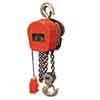 |
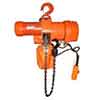 |
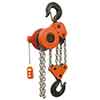 |
|
DHS Series Electric Hoists:1 ton, 2 ton, 3 ton, 5 ton,10 ton |
TCH series Chain Electric Hoist:1 ton, 2 ton, 3 ton, 5 ton,10 ton |
DHP series Chain Electric Hoists:1 ton, 2 ton, 3 ton, 5 ton,10 ton |
More information about Chain Electric Hoist, please click.
Wire rope electric hoists
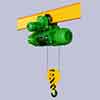 |
Electric hoists and electric hoists- wire rope single speed
wire rope electric hoist single speed 0.25 ton, 0.5 ton, 1 ton, 2 ton, 3 ton, 5 ton, 10 ton, 16 ton |
Please click for more information about Wire Rope Electric Hoist.
Double speed electric hoists
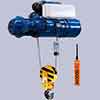 |
Dongqi Hoists can provide you double speed electric hoists with the lifting capacity of 0.25 ton to 32 ton. Wire rope electric hoist double speed 0.25 ton, 0.5 ton, 1 ton, 2 ton, 3 ton, 5 ton, 10 ton, 16 ton |
Please click for more information about Double Speed Electric Hoist.
European electric hoists
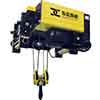 |
European electric hoist is a newly developed material handling equipment with advanced design technology according to the FEM standards, European hoist standards and other regulations. The lifting capacity of the European electric hoist is 1 to 80 tons and the working class is M5 and M6. |
Please click for more information about European Electric Hoist.
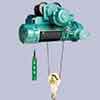 |
Dongqi Hoists can provide explosion proof hoists with the lifting capacity of 0.25 ton to 63 ton, and the lifting height of 1 m to 100m, with the working class of M3. What’s more, single speed explosion –proof hoists and double speed explosion-proof hoists. And, customized explosion proof hoists are available. |
Please click for more information about Explosion Proof Electric Hoist.
Metallurgical electric hoist
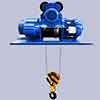 |
Metallurgical hoist offered by Dongqi has a lifting capacity of 1-10ton, lifting height 9-30m, the working class of M6. And customized metallurgy hoists for metallurgical industries are available.
|
Please click for more information about Metallurgy Electric Hoist.
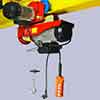 |
Mini electric hoist single hook 100 kg , 125 kg, 150 kg, 200 kg, 250 kg, 300 kg, 400 kg, 500 kg
Mini electric hoist with double hook 200 kg, 250 kg, 300 kg , 400 kg, 500 kg electric hoist The lifting speed of the mini or small hoists can be up to 10 m/min. |
Please click for more information about Mini Electric Hoist .
Manual hoist and hand hoist
Manual hoist and hand hoist is a type of light hand operated hoisting equipment, which solves the material handling problems with man power, with the features of easy operation, cost-effective, wide application, etc. Dongqi Hoist offers types of manual hoists or hand operated hoists, such as, manual
Manual hoist – Chain type
| CB-1 manual hoist | CB-11 manual hoist, | VC-B manual hoist |
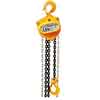 |
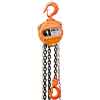 |
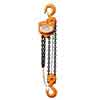 |
| CB-1 manual hoist series:
1 ton, 1.5 ton , 2 ton , 3 ton , 5 ton, 10 ton
|
CB11 series manual hoists: 1 ton, 1.5 ton , 2 ton , 3 ton , 5 ton, 10 ton
|
VC-B manual hoist:
0.5 ton 1 ton ,1.5 ton, 2 ton, 3 ton, 5 ton, 10 ton, 20 ton, 30 ton, 50 ton , |
| CK type manual hoist | SK Series of manual hoist | HS-T type manual hoist |
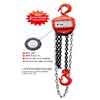 |
 |
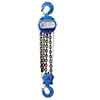 |
| CK type manual hoist 1 ton, 1.5 ton , 2 ton , 3 ton , 5 ton , 10 ton , 20 ton, | SK Series of manual hoist 0.5 ton, 1 ton , 1.5 ton , 2 ton, 3 ton , 5 ton , 8 ton , 10 ton, 16 ton , 20 ton | HS-T series of manual hoist 0.5 ton, 1 ton , 1.5 ton , 2 ton, 3 ton , 5 ton , 8 ton , 10 ton, 16 ton , 20 ton, |
| HS-C type series manual hoist
|
HS-Z type series manual hoist
|
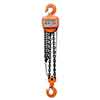 |
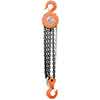 |
| HS C Series of manual hoist 0.5 ton, 1 ton , 1.5 ton , 2 ton, 3 ton , 5 ton , 20 ton,
|
HS-Z series Series of manual hoist0.25 ton, 0.5 ton, 1 ton , 1.5 ton , 2 ton, 3 ton , 5 ton ,10 ton , 15 ton, 20 ton ,30 ton, |
Please click for more information about manual chain hoists.
| Manual hoist- explosion-proof type | |
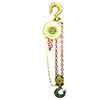 |
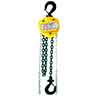 |
| Explosion proof hand hoist 0.5 ton, 1 ton,2 ton, 3 ton , 5 ton , 10 ton, 20 ton | VN explosion-proof manual hoist t 0.5 ton, 1 ton , 1.5 ton , 2 ton, 3 ton , 5 ton , 10 ton, 20 ton, etc |
Please click for more information about manual chain hoists.
Manual hoist and hand hoist – Lever type
| VC-A series lever hoist | VA series hand hoist | VD type lever hoist |
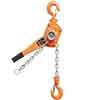 |
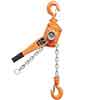 |
 |
| VC-A series manual hoist 0.5 ton, 1 ton, 1.5 ton, 2 ton , 3 ton , 5 ton , 10 ton , 20 ton , 30 ton, 50 ton , | VL lever chain hoist 0.5 ton ,0.75 ton ,1 ton , 1.5 ton, 2 ton , 3 ton, 6 ton, | VD type lever 250 kg, 500 kg , 750 kg, 1500 kg , 2500 kg ,3000 kg, 5000 kg, 60000 kg , |
Wire rope lever hand hoist
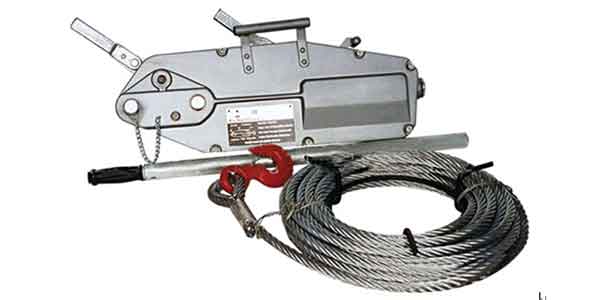
Please click for more information about leaver hand hoists.
